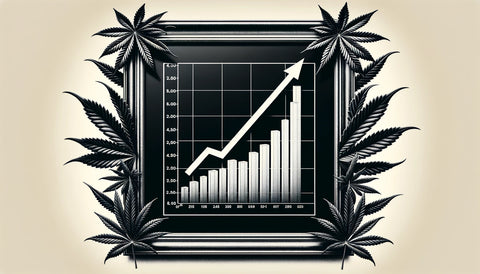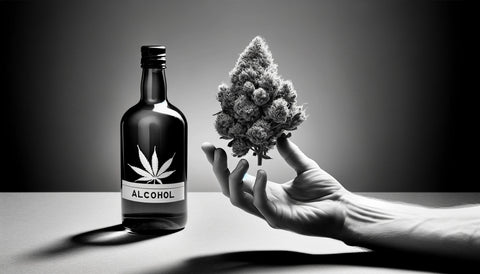In recent years, a significant shift has been unfolding in the world of recreational substances. As legal cannabis gains a foothold across various states, its impact is resonating far beyond its own industry, encroaching into territories traditionally dominated by alcohol. This emerging trend is not just a mere fluctuation in consumer preferences but a paradigm shift signaling a profound change in societal norms and behaviors.
A series of compelling reports, most notably by TD Cowen analyst Vivien Azer, have thrown light on this evolving landscape. According to Azer's insights, legal cannabis is not just blossoming in isolation; it's actively luring consumers away from alcohol. With cannabis sales expected to hit $29 billion in 2023 and projections of steady growth, it's becoming evident that cannabis is no longer just an alternative choice, but a formidable competitor to alcohol.
This blog delves into the heart of this market shift, unraveling how and why cannabis is increasingly becoming the substance of choice over traditional alcoholic beverages. From analyzing market trends and consumer behavior to examining demographic shifts and industry impacts, we explore the multiple facets of this significant transition. As we navigate through this changing landscape, we ponder what this means for the future of both industries and how this shift might reshape societal norms and health outcomes in the years to come.
Market Trends and Consumer Behavior

The evolving landscape of consumer preferences in the realm of recreational substances is marked by a noticeable shift from alcohol to cannabis. This transition is particularly pronounced in states where cannabis has been legalized, leading to a discernible impact on alcohol sales. A report from TD Cowen analyst Vivien Azer highlights that in these states, alcohol sales have underperformed by 100-150 basis points over the past five years. This trend is reflective of a broader market shift where cannabis is not just a niche player but a significant force reshaping consumer habits.
In 2023, the U.S. cannabis market was projected to reach $29 billion in sales, capturing about 11% of what the alcohol industry brings in. This growth is up from a mere 4% just five years ago, indicating a rapid expansion and acceptance of cannabis. The growth trajectory of cannabis is expected to continue at a steady pace, with a Compound Annual Growth Rate (CAGR) of 7% over the next five years. This growth trend contrasts starkly with the stagnation or even decline in alcohol consumption, particularly in legal cannabis states.
The shift is not just about numbers; it reflects a deeper change in consumer behavior. More than two-thirds of cannabis users report reducing their alcohol intake, suggesting a preference for cannabis over traditional alcoholic beverages. This trend is especially prevalent among younger consumers, who are increasingly opting for cannabis, citing health concerns and lifestyle choices as key factors. As cannabis becomes more mainstream, and the stigma around its use diminishes, these behavioral shifts are expected to become more pronounced, further influencing market dynamics.
Demographic Shifts and Consumer Retention

The changing landscape of substance preference is particularly noticeable among younger demographics. TD Cowen's report sheds light on this trend, revealing that among 18-25 year-olds, cannabis category retention has grown to 68%, while alcohol category retention has fallen to 74% in 2022. This shift is indicative of the changing attitudes towards cannabis and alcohol among younger generations.
These demographic shifts have profound implications for the market. Young consumers are not only experimenting with cannabis but are also showing a strong tendency to stick with it over alcohol. This retention rate suggests that the appeal of cannabis goes beyond mere novelty; it's becoming an integrated part of young adults' lifestyles. As these consumers age, their preferences are likely to continue shaping market trends, potentially leading to a long-term shift in the overall consumer base of recreational substances.
The preference for cannabis over alcohol among younger adults is not an isolated trend. It's part of a broader shift in societal norms, where wellness and health-conscious decisions are becoming more prevalent. Younger consumers are more informed and selective about their recreational choices, opting for substances that align with their lifestyle and health goals. Cannabis, often perceived as a 'safer' and 'healthier' option compared to alcohol, fits well into this narrative.
As we witness these demographic shifts, it's crucial to understand their long-term implications. The preferences of these younger demographics are likely to shape the future market landscape for both cannabis and alcohol. The growing retention rate of cannabis consumers could signify a lasting change in recreational substance use, with potential impacts on public health, social norms, and the economy.
Regional Case Studies – Focus on Colorado

Colorado, a pioneer in legalizing recreational cannabis, serves as a compelling case study in understanding the shift from alcohol to cannabis. Since the legalization of retail sales for adult-use cannabis, the market in Colorado has grown significantly, now accounting for 11% of alcohol sales, a substantial increase from just 4% five years prior. This remarkable growth in the cannabis sector within Colorado is emblematic of broader consumer preference trends across the United States.
Colorado's experience suggests that the appeal of cannabis extends beyond the novelty of its legalization. The state has seen a sustained increase in cannabis sales, indicative of a deeper, more enduring shift in consumer behavior. This trend is supported by TD Cowen's analysis, which highlights the state as a leading indicator of national trends. The report underscores that the growth in cannabis sales is not just a temporary surge but part of an ongoing transformation in consumer preferences.
The case of Colorado also reveals important insights into the types of alcohol products most affected by the rise of cannabis. Beer, in particular, seems to be taking the biggest hit. The percentage of past-month cannabis users who prefer beer has notably declined, reflecting a shift in recreational substance choice among consumers. This trend has significant implications for the alcohol industry, particularly for brands and products that have traditionally relied on a younger consumer base.
Industry Impacts and Future Projections
The impact of increasing cannabis sales on the alcohol industry is multifaceted. In the short term, alcohol companies may be able to navigate these shifting consumer trends without significant difficulties. However, in the medium to long term, certain segments of the alcohol market, especially beer, may face more substantial challenges. The TD Cowen report suggests that as cannabis continues to carve out a larger share of the recreational substance market, alcohol, particularly beer, will likely continue to underperform in states with legal cannabis.
Future projections indicate that the alcohol industry will need to adapt to these changes. While overall alcohol sales are expected to grow modestly, the increasing preference for cannabis among consumers, especially younger demographics, could lead to a sustained underperformance in certain alcohol categories. This shift offers an opportunity for innovation and diversification within the alcohol industry, potentially leading to the development of new products that can coexist with cannabis.
Looking ahead, the growing acceptance and legalization of cannabis in additional states are expected to further bolster the cannabis market. TD Cowen projects that U.S. legal cannabis retail sales will reach $37 billion by 2027. This growth, coupled with evolving consumer preferences, suggests a continued shift towards cannabis at the expense of traditional alcohol consumption.
The alcohol industry's response to these trends will be critical in shaping its future trajectory. While certain segments like tequila and bourbon may continue to perform well, the industry as a whole may need to rethink its strategies to remain relevant and competitive in an increasingly cannabis-friendly marketplace.
Societal and Health Implications

The shifting tide from alcohol to cannabis consumption carries with it significant societal and health implications. As more consumers opt for cannabis over traditional alcoholic beverages, there's a potential for notable changes in public health outcomes and social behaviors. One of the critical aspects of this shift is the perception of cannabis as a safer alternative to alcohol. Studies have shown that, compared to alcohol, cannabis has a lower risk of addiction and doesn't contribute to long-term health issues like liver disease and various cancers associated with heavy drinking.
Another health implication worth considering is the potential reduction in alcohol-related incidents, such as drunk driving and alcohol-induced violence. As cannabis typically doesn't lead to the same level of impairment as alcohol, its increased use could lead to a decrease in these incidents, positively impacting public safety.
From a societal perspective, the growing acceptance and use of cannabis reflect changing social norms and attitudes towards recreational substance use. The legalization and normalization of cannabis use can lead to a reduction in the stigma associated with its consumption, which has historically been a source of social and legal issues. This shift might also influence policy-making and law enforcement related to substance use and possession.
Conclusion
The trajectory of cannabis overtaking alcohol sales is a clear indicator of changing consumer preferences and societal norms. The rise of cannabis, as evidenced by market trends, demographic shifts, and regional case studies like Colorado, signifies a profound shift in the recreational substance landscape. With cannabis sales projected to continue growing robustly, the alcohol industry faces the challenge of adapting to these changes to maintain relevance in an increasingly cannabis-friendly market.
The implications of this shift extend beyond mere market dynamics; they touch upon broader societal and health aspects. The perception of cannabis as a safer alternative to alcohol has the potential to bring about positive changes in public health outcomes and social behaviors. However, this transition also calls for a nuanced understanding of the consequences of increased cannabis use and the need for responsible consumption and regulation.
As we move forward, it's essential to continue monitoring these trends and their implications on public health, safety, and social norms. The ongoing evolution in consumer preferences towards cannabis presents both opportunities and challenges for the market, society, and policymakers. The landscape of recreational substances is undergoing a significant transformation, one that will shape the future of how we perceive and consume these products.
E10 Labs: Leading the Way in Cannabis Innovation Amidst the Alcohol-Cannabis Shift
As the cannabis industry continues to reshape the landscape of recreational consumption, E10 Labs stands at the forefront of this transformation. Our innovative products, the elon® heat-not-burn device and the iven® dry herb vaporizer, are pivotal in steering the current shift from alcohol to cannabis, offering consumers a risk reduced and more sophisticated way to enjoy cannabis.
Innovative Technology for Health-Conscious Consumers

In the midst of a market that's increasingly favoring cannabis over alcohol, E10 Labs introduces the elon device, a heat-not-burn solution that caters to health-conscious consumers. Unlike traditional smoking methods, elon heats cannabis to an optimal temperature without burning it, thereby releasing the desired compounds without the harmful byproducts of combustion. This technology aligns with the growing consumer preference for risk-reduced, less harmful ways to consume cannabis, drawing a clear line between the outdated methods associated with alcohol consumption and the innovative, wellness-oriented approach of cannabis.
Iven Dry Herb Vaporizer: Elevating the Cannabis Experience
Complementing our elon device, the iven dry herb vaporizer offers a pure, potent, and precise way to consume dry herbs. As consumers increasingly seek out cannabis for its wellness benefits over the more harmful effects of alcohol, iven provides a perfect solution. It combines the traditional appreciation of dry herbs with cutting-edge technology, ensuring a clean and efficient consumption experience. This approach not only meets the demand of modern consumers but also positions E10 Labs as a key player in the evolving landscape where cannabis is gaining preference over alcohol.
Aligning with Market Trends and Consumer Preferences
The rise of E10 Labs in the cannabis industry is a direct response to the shifting trends and consumer preferences. As the market witnesses a decline in alcohol sales and an incline in cannabis usage, our products like elon and iven are perfectly positioned to meet the new demands. They offer a sophisticated, health-conscious alternative to traditional alcohol consumption, appealing to a growing segment of the market that prioritizes wellness and responsible consumption.
Conclusion
E10 Labs is not just a participant in the cannabis industry; we are pioneers shaping the future of recreational consumption. As the trend of cannabis overtaking alcohol sales continues, our innovative products like the elon heat-not-burn device and the iven dry herb vaporizer stand as testaments to our commitment to quality, wellness, and cannabis. With our finger on the pulse of consumer preferences, E10 Labs is leading the charge in a market that is rapidly embracing cannabis as the preferred choice over alcohol.



